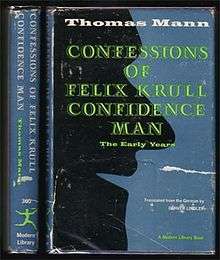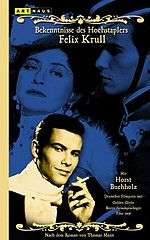Confessions of Felix Krull
 English 1st edition | |
| Author | Thomas Mann |
|---|---|
| Original title | Bekenntnisse des Hochstaplers Felix Krull. Der Memoiren erster Teil |
| Country | Germany |
| Language | German |
| Genre | Novel |
Publication date | 1954 |
Published in English | 1955 |
| Media type | Print (Hardback & Paperback) |
| ISBN | 0-679-73904-1 |
| OCLC | 25200982 |
| 833/.912 20 | |
| LC Class | PT2625.A44 B313 1992 |
Confessions of Felix Krull is an unfinished 1954 novel by the German author Thomas Mann. It is a parody of Goethe's autobiography Poetry and Truth, particularly in its pompous tone.[1][2][3] The original title is Bekenntnisse des Hochstaplers Felix Krull. Der Memoiren, erster Teil, translated a year later in English as Confessions of Felix Krull, Confidence Man: The Early Years.

Mann planned the novel since 1905, being inspired by the Romanian con artist Georges Manolescu's autobiographies Fürst der Diebe (A Prince of Thieves) and Gescheitert (Failed). Originally the character of Felix Krull appeared in a short story written in 1911. The story was not published until 1936, in the book Stories of Three Decades, along with twenty-three other stories written between 1896 and 1929, the year in which he was awarded the Nobel Prize for Literature. Much later, Mann expanded the story and managed to finish and publish part one of the Confessions of Felix Krull but due to his death in 1955, the saga of Felix, the morally flexible and irresistible conman remains unfinished.
A spoken word adaptation of chapters 1, 2, 3 and 5 from the first book (dem Buch der Kindheit) of Felix Krull performed by O. E. Hasse, was included as a companion disk to the 1965 Teldec (Telefunken-Decca) release of Schwere Stunde (performed by Thomas Mann).
Movie
The book was adapted into a film in 1957, with a screenplay by Erika Mann and Robert Thoeren, directed by Kurt Hoffmann, and starring Horst Buchholz as Krull.[4]
Notes
- ↑ Mann's Letter to Paul Amann, 3 August 1915, quotation:
translation:eine Parodie auf Dichtung und Wahrheit, aber positiv endlich doch in seiner verzerrten Lyrika parody of Poetry and Truth, but in the end arriving at something new in its distorted lyricism. - ↑ Schonfield (2008) p.19
- ↑ Schwarz (2004) p.257
- ↑ http://www.imdb.com/title/tt0050179/
References
- Luis Montiel. Told by a myth : Thomas Mann’s Felix Krull. Culture & History Digital Journal 2(2), December 2013, e029, eISSN 2253-797X doi: http://dx.doi.org/10.3989/chdj.2013.029
- Ernest Schonfield (2008) Art and its uses in Thomas Mann's Felix Krull
- Schwarz, Egon (2004) Felix Krull in Lehnert, Herbert and Wessell, Eva (2004) A companion to the works of Thomas Mann pp. 257–269
- Mann, Thomas and Amann, Paul (1960) Letters to Paul Amann, 1915-1952
| ||||||||||||||||||
|